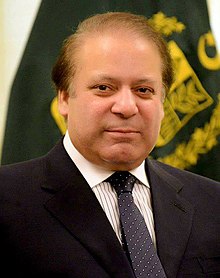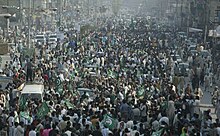Nawaz Sharif

Mian Mohammed Nawaz Sharif ( Urdu میاں محمد نواز شریف; * December 25, 1949 in Lahore ) is a Pakistani politician of the Muslim League PML-N and head of the industrial group Ittefaq , which belongs to the politically influential Sharif family .
Life
Origin and education
Nawaz Sharif comes from the influential Sharif family , who, along with the Bhutto family, traditionally had great influence in Pakistani politics.
The family is of Kashmiri origin. The family of the father Mian Muhammad Sharif came from Anantnag and the family of the mother Shamim Akhtar from Pulwama ; both places are now in Jammu and Kashmir, India . Nawaz Sharif's father was born in a village near Amritsar in what is now the Indian part of Punjab and his family moved to Lahore in 1936 for business reasons in what will later be the Pakistani part of Punjab , where Nawaz Sharif was born in 1949. He attended Government College there and then studied law at the University of the Punjab in Lahore. Then he worked as a businessman.
In 1971 he married Kulsoom Nawaz, who also came from a family of Kashmiri origin. The marriage resulted in two sons, Hassan and Hussain, and two daughters Maryam and Asma.
The Sharif family's extensive business holdings were badly shaken after a policy of nationalization was instituted under then Prime Minister Zulfikar Ali Bhutto in the 1970s . This was the trigger for Nawaz Sharif to go into politics with his brother Shehbaz Sharif . The immediate goal of the brothers was initially to regain the expropriated family property.
Political career
In 1976 he joined the conservative Muslim League . He had close ties with General Muhammad Zia-ul-Haq's military regime in the 1980s.
On October 24, 1990 by the Muslim League-dominated party alliance won Islamic Democratic Alliance , led by Nawaz Sharif's parliamentary elections in Pakistan against the PPP of Benazir Bhutto . Nawaz Sharif became Prime Minister and returned to Mohammed Zia ul-Haq's policy of Islamization.
In April 1993, Nawaz Sharif was sacked by President Ishaq Khan . Benazir Bhutto became Prime Minister again. In the parliamentary elections on February 3, 1997 after Benazir Bhutto's dismissal, the Muslim League under Nawaz Sharif won an absolute majority. On October 12, 1999, Nawaz Sharif was deposed by the Army Chief of Staff, Pervez Musharraf , in a bloodless coup .
In December 2000, Pervez Musharraf and Nawaz Sharif agreed, with the mediation of Saudi Arabia and Lebanon's former premier Rafik al-Hariri , that Sharif should leave Pakistan for Saudi Arabia for ten years. In return, allegations against Nawaz Sharif such as treason , tax evasion and corruption should be dropped.
In the parliamentary elections on October 10, 2002, a split from the Muslim League, the Pakistan Muslim League Quaid-e-Azam (PML-Q), close to President Pervez Musharraf , became the strongest faction. The Muslim League Nawaz Sharifs (PML-N) was just a splinter party.
After Sharif went into exile in Saudi Arabia and then to London after the coup , he and his brother Shehbaz Sharif were allowed to return to Pakistan by the Pakistani Supreme Court in August 2007. He took this opportunity. However, he was arrested on September 10, 2007 on his arrival at Islamabad airport on charges of corruption and immediately deported to Saudi Arabia.
He returned to Pakistan on November 25, 2007 and was greeted by thousands of supporters upon his arrival in Lahore. The next day he registered as a candidate for the general election on January 8, 2008 . At the same time, he ruled out a collaboration with Pervez Musharraf while he was president.
In the parliamentary election , which was postponed to February 18, 2008 after the assassination of Benazir Bhutto , Sharif's PML-N was able to establish itself as the second largest party, ahead of the Muslim league PML-Q, which is closely related to Musharraf. The attempt to form a coalition government together with the PPP failed five months and a week after the resignation of President Musharraf, when Sharif ended support from Prime Minister Yousaf Raza Gilani .
The conflict between opposition leader Sharif and the Pakistani government intensified when the Supreme Court of Justice banned Sharif from politics in February 2009. There were violent protests by supporters of Sharif in the provincial capital Lahore .
In March 2009, Sharif's Muslim League and numerous lawyers called for several days of protests against government policies. In a "Long March" on the capital Islamabad , demonstrations were to take place for an independent judiciary in Pakistan. On March 15, 2009, serious riots broke out between supporters of Sharif and the police in Lahore. After the Pakistani government gave in to the opposition's main demand and announced the reinstatement of several judges, including former Chief Justice Iftikhar Muhammad Chaudhry , Sharif canceled the "Long March".
In the parliamentary elections in Pakistan on May 11, 2013 , Nawaz Sharif as the top candidate of the Pakistani Muslim League (Nawaz) (PML-N) unexpectedly achieved at least 130 of the 371 seats in parliament for many observers. He was particularly successful in his home province of Punjab. On June 5, 2013, he was re-elected Prime Minister.
Sharif came under the firing line of public criticism when it became known in 2015 that three of his children were involved in the Panama Papers scandal, ie had investments with the Panamanian offshore service provider Mossack Fonseca . On April 20, 2017, the Supreme Court ruled that there was insufficient evidence to convict. Therefore, a " Joint Investigation Team " ( JIT) was set up to investigate this matter.
On July 10, 2017, the JIT submitted its investigation results to the Supreme Court. The report found that Sharif's children had provided conflicting information. In addition, Maryam Safdar , the daughter of Nawaz Sharif, submitted documents to the Supreme Court dated 2006 in the Calibri font . Since Calibri was not released until 2007, it was evident that documents had been forged. On July 19, 2017, Maryam Safdar presented a document from London, which was dated a Saturday. In Great Britain, however, authorities are closed on Saturdays. In addition to the allegation of money laundering, there was also a charge of forgery. On December 24, 2018, Sharif was sentenced to seven years in prison for corruption.
Impeachment and legal proceedings
On July 28, 2017, the Pakistani Supreme Court removed Nawaz Sharif from his position. Wrong and incomplete information about his financial situation became his undoing. In addition, Sharif was banned from politics for life on April 13, 2018. On July 6, 2018, Sharif was sentenced to 11 years in prison. He received 10 years imprisonment for undeclared income and an additional year for non-cooperation with the court. Along with him, his daughter Maryam Nawaz Sharif and son-in-law Safdar Awan were sentenced to prison terms. His daughter was given seven years for “promoting a crime” and an additional year for not cooperating with the court and his son-in-law received one year for not cooperating. Daughter and son-in-law were also fined the equivalent of 9 million euros.
Sharif, who was in London at the time the verdict was pronounced, where his wife was being treated for cancer ( malignant lymphoma ), announced that he would return to Pakistan and appeal the verdict there. On September 19, 2018, Sharif was released early on bail .
Web links
- Muhammad Nawaz Sharif: The Future Pakistan Deserves. In: Washington Post . January 1, 2008, archived from the original on February 9, 2013 .
- Christoph S. Sprung: Mian Nawaz Sharif - Former Prime Minister of Pakistan. South Asia Information Network , July 7, 2001 .
- John Pike: The Sharif family. GlobalSecurity.org (English).
- Pakistan Muslim League website - Nawaz. (English).
Individual evidence
-
↑ Muzamil Jaleel, Muzamil Jaleel: As Nawaz Sharif becomes PM, Kashmir gets voice in Pakistan power circuit. In: The Indian Express . June 6, 2013, accessed July 29, 2017 . Mian Sharif this in Jeddah. Dawn , October 30, 2004, accessed July 7, 2018 .
- ^ Nawaz Sharif Fast Facts. CNN Library , December 15, 2017, accessed July 8, 2018 .
- ↑ Kulsoom Nawaz and Shehbaz Sharif: The Possible Successors of Nawaz Sharif. news18.com, July 29, 2017, accessed July 7, 2018 .
- ^ Mazhar Abbas: From entry to exit: The politics of Mian Mohammad Nawaz Sharif. In: Geo TV . April 14, 2018, accessed July 7, 2018 .
- ↑ Pakistan: Triumph for Bhutto Party. In: The time . February 19, 2008. Retrieved July 8, 2018 .
- ↑ Sabina Matthay: The end of an alliance of convenience. In: Tagesschau . August 25, 2008, archived from the original on August 27, 2008 ; accessed on August 5, 2018 .
- ↑ Protests expected after the Sharif judgment. In: Focus Online . February 26, 2009. Retrieved July 8, 2018 .
- ↑ Sabina Matthay: Escalation before “Long March”. In: Tagesschau . March 15, 2009, archived from the original on September 11, 2009 ; accessed on August 5, 2018 .
- ^ Political crisis in Pakistan defused. In: Neue Zürcher Zeitung . March 15, 2009. Retrieved July 8, 2018 .
- ↑ Pakistan's parliament elects Nawaz Sharif. In: stern.de . June 5, 2013, accessed July 8, 2018 .
- ↑ Secunder Kermani: Pakistani corruption case hinges on a font. In: BBC News . July 12, 2017, accessed July 6, 2018 .
- ^ Former Prime Minister Sharif sentenced to seven years in prison in: FAZ, December 24, 2018, accessed on December 25, 2018
- ↑ Pakistan's prime minister falls over "Panama Papers". In: tagesschau.de. July 28, 2017. Retrieved July 8, 2018 .
- ^ Lifelong political ban for Sharif. In: tagesschau.de. April 13, 2018, accessed July 8, 2018 .
- ↑ Pakistan's ex-prime minister Nawaz Sharif sentenced to ten years in prison. In: Handelsblatt.de . July 6, 2018, accessed July 8, 2018 .
- ↑ Pakistan ex-PM Nawaz Sharif given 10-year jail term. BBC , July 6, 2018, accessed July 6, 2018 .
- ↑ Pakistan's former Prime Minister Sharif free again in: Frankfurter Allgemeine Zeitung, September 19, 2018, accessed on September 19, 2018
| predecessor | Office | successor |
|---|---|---|
|
Ghulam Mustafa Jatoi Miraj Khalid Mir Hazar Khan Khoso |
Prime Minister of Pakistan 1990–1993 1997–1999 2013–2017 |
Moinuddin Ahmad Qureshi Zafarullah Khan Jamali Shahid Khaqan Abbasi |
| personal data | |
|---|---|
| SURNAME | Sharif, Nawaz |
| ALTERNATIVE NAMES | Sharif, Mian Mohammed Nawaz; میاں محمد نواز شریف |
| BRIEF DESCRIPTION | Pakistani politician, Prime Minister of Pakistan |
| DATE OF BIRTH | December 25, 1949 |
| PLACE OF BIRTH | Lahore |

